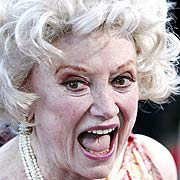 |
 |
 |
 Entertainment | Books | March 2005 Entertainment | Books | March 2005  
Autobiographies Prove That Comedy Is Not Pretty
 Susan Kelly - USA TODAY Susan Kelly - USA TODAY


| Unfunny business: Phyllis Diller's Lampshade has some harsh words for her two husbands. (Photo: Getty Images)

|
The late comedian Marty Feldman observed that "the pen is mightier than the sword and considerably easier to write with."

His witticism comes to mind in reading new memoirs from two very different comic entertainers: Phyllis Diller's Like a Lampshade in a Whorehouse and Gene Wilder's Kiss Me Like a Stranger.

Diller was a groundbreaking stand-up who opened the door for generations of female comedians. Wilder was the star of classic film comedies in the 1970s and '80s, partnering with the likes of Mel Brooks and Richard Pryor.

Diller and Wilder are alike, however, in that they had easy access to their anger in crafting memoirs that seem motivated at least in part by a desire to skewer inadequate friends, lovers and colleagues. Both claim to have reached a safe harbor in their lives, but they've obviously sent their baggage ahead.

Diller's tough-talking tome is more interesting. Lampshade gains some levity from slices of Diller's stand-up routine that punctuate the passages. The title comes from one of these: "You think I'm overdressed? This is my slip. ... No, I'm going to tell you the truth about what I'm wearing. I used to work as a lampshade in a whorehouse. I couldn't get one of the good jobs."

Her chief adversaries are her two husbands: one a slug and the other a drunk. But she also encounters a parade of people who — inexplicably in her view — dislike her.

Diller made a meal ticket of her broken nose, crooked teeth and raucous laugh. She reinvented herself on stage as an inept housewife married to the dimwit "Fang."

Her journey is fascinating in many ways. Fueled in the 1950s by ambition and the need to support a husband and five children, she entered the nightclub circuit of San Francisco, New York and Chicago.

Although she struck a chord with audiences, the comedy world did not greet her with open arms. Diller suffered slights at the hands of contemporaries like Jackie Mason and Victor Borge but formed lasting bonds with talk-show host Jack Paar and screen legend Bob Hope.

Diller's career spanned decades, but she and her family paid a steep price for that success. Her oldest son did not see her for many years before his death from cancer.

So it's not a funny story, except for some of those jokes. ("I was the world's ugliest baby. When I was born, the doctor slapped everyone.")

Speaking of needing a slap, Wilder purports to show his search for love and art but only documents his lifelong love affair with himself.

Kiss will be most disappointing to fans of the gifted actor and his performances in films like The Producers (1968), Blazing Saddles (1974) and Young Frankenstein (1974). He worked with the top actors and directors of his time, but they are mere props in this story, mirrors used to reflect the author. Among the exceptions are Brooks and Carol Channing, veterans of stage and screen whose personalities bleed through by virtue of their extreme eccentricity.

His "loves" are similarly featureless. Like Diller, he harbors a deep dislike of his first spouse, a fellow actor, and has long been estranged from his adopted daughter.

Given that part of the story is framed in a therapy session, it may be appropriate that passive aggression flows through the narrative. Wilder's most famous partnerships were with Pryor, a troubled comic genius with whom he starred in four films, including Silver Streak (1976) and Stir Crazy (1980), and his third wife, comedienne Gilda Radner of Saturday Night Live fame, who died of cancer in 1989 at 43.

Although he alludes to "moments of magic" in both relationships, the stronger impression he leaves of Pryor and Rad-ner is that they acted badly, Pryor because of drug problems and Radner because of her anger during the cancer treatments. He recalls, "I had begged her to treat me at least with the kindness that she showed to every stranger she met."

The book's title is taken from a remark of Radner's that took on added significance for Wilder when he found his true love: his current wife, Karen. The most passionate parts of Wilder's narrative are those that describe Karen, his successful auditions and his own fight with cancer, which appears to have been remarkably free of ill temper.

If you're a fan of Diller or Wilder, you'd be better served by buying a DVD and savoring the illusions they spent a lifetime creating. The reality, it seems, is no laughing matter. | 
 | |
 |



